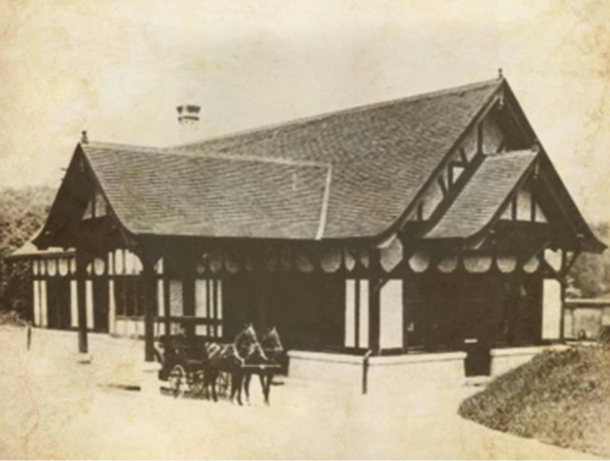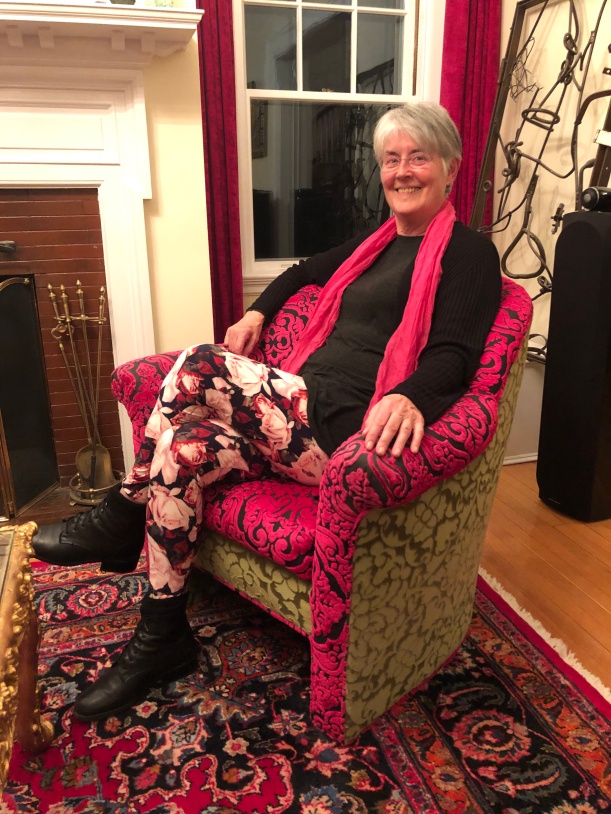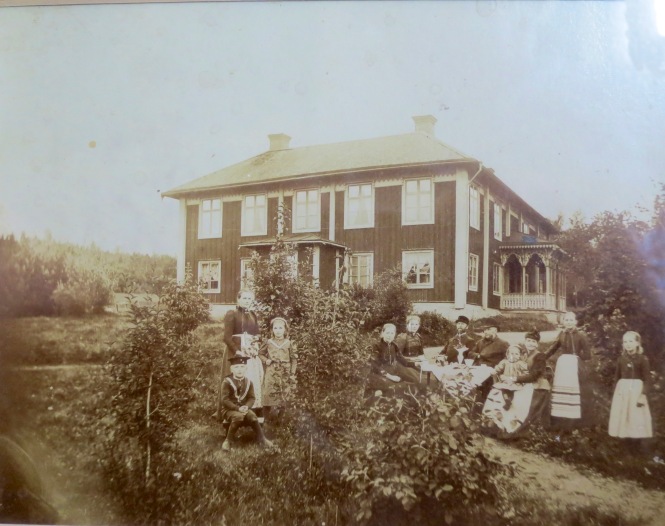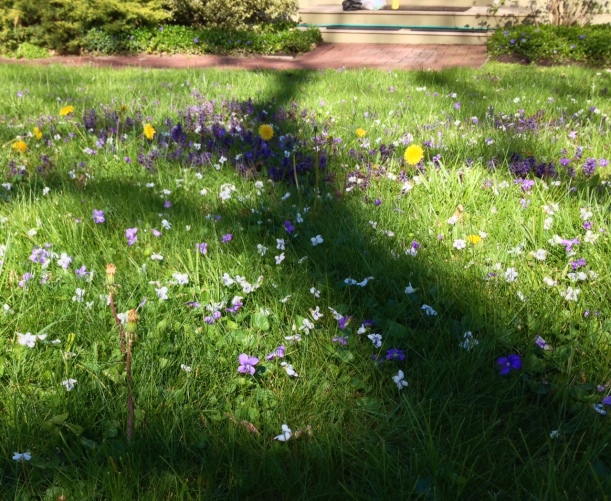Seventy years ago, when I was five (and a half), my family moved to the leafy village where I would do most of my growing up. Around my milestone birthday this year, I was visited by intense visions of that place. My places. Certain trees. Certain rocks. Certain brooks. The visions were so strong that I almost felt I was there, in that particular there where kids live their secret kid lives. To exorcise these hallucinations I am going to write about them. If that doesn’t make them go away, at least the writing will keep my fingers limber.
Our Village, as the denizens loved to call it, was just a short train ride up the Hudson from New York City. The place has had many names. First it was called ‘Ossininck’, then Philipse Manor, also Scarborough, Sleepy Hollow, and Whitson’s Corner; until it was incorporated in 1903 by its Founding Father and officially named “Briarcliff Manor.”
Our founder was one Walter Law, an up-from-poverty British immigrant who, having become fabulously rich in business, threw it all over to become a gentleman farmer. At the turn of the twentieth century Law bought up most of the land that comprised Our Village, and created a model farming operation (named Briarcliff Farms), featuring a model dairy producing model milk and hothouse flowers for New York City.
He built himself and his family a fancy mansion called “The Manor.” In 1902 he opened a monster Tudor Revival luxury resort hotel called Briarcliff Lodge (the biggest, best, and only hotel in Westchester County; and the only one equipped with in-room telephones and a mooring mast for dirigibles, should one ever fly to the Lodge. None ever did). The rich and famous came flocking to the Lodge to escape the heat of the city and stroll on its manicured grounds and golf links.
Being an old-school philanthropist, Law created his own personal model village. He built a gorgeous Tudor Revival railway station, so that when the Vanderbilts and Roosevelts and the royalty and other important people embarked from the train, they knew they were in for a fabulous Tudor Revival time.
Law also donated our Windsor Castle look-alike school, the town parks, and the nation’s first-ever public swimming pool. He also endowed the Congregational church and put a genuine Tiffany window in the transept. Of course he named his creation “Briarcliff Manor.” Walter William Law was our Benevolent overlord, and no complaints were uttered about it. Our Village was faerieland.
The pretty railroad station, the pool, the parks and the Congregational Church and its hypnotic window, figured powerfully in my life as a child in Briarcliff when I arrived forty-three years after its naming. Built to last, they still exist today. The majestic Briarcliff Lodge, which I saw exactly once, burned to the ground fifteen years ago.
I didn’t know any of this fascinating Briarcliff history at first because I was five (and a half) at the time. What I knew was, there were briars. There was also a cliff, a monstrous massif running north to south the whole length of the town. This hill once separated the rich from the middle and lower classes. The wealthy claimed the highlands– rusticating and playin golf at the Lodge, and building their extravagant summer homes.
The Law employees and other ordinary folk lived at the eastern base of the hill, in the moist bottomlands of the Pocantico River. We kidfolk knew we had the best of it down there: the school and the ballfields and the pool and the skating pond and the trains and the Fire Station that blew its whistle every day at noon; and Pete’s Soda Fountain and the Rec Hall and Library. That was where ordinary Village Life took place. And did it ever.
Youngsters in Briarcliff led a feral life most of the time. We roamed any and everywhere, or as far as a twenty-pound Schwinn bike would take a sixty-pound kid. We courted death by climbing into the swaying tops of trees, or fishing off the very dangerous railroad trestle that spanned the Pocantico, or forming secret clubs (The Stargazing Club. The Indian Club. The short-lived but thrilling Lurkers Club, whose sworn mission it was to peep through people’s windows after dark. Punishment was swift and harsh), or pressing our little ears onto the railroad tracks to listen for approaching trains.
We also drank deep from the well of the organized Village Life that our elders cooked up in hopes of giving us the rudiments of civilization. Our good parents, secure in the knowledge that we were safe somewhere or other, and would probably not die in spite of our best efforts to do so, volunteered for any and everything from the fire department to the Scouts; they sat on steering committees and planning boards devoted to elevating community life to near-unbearable levels of bliss.
Among the civic activities that our parents planned for us: swim lessons and tennis lessons at the Park, the town variety show, concerts, field days, visiting attractions (Rex Trailer and his Wonder Horse!) fairs, firemen’s bazaars, flower shows, pet shows, junior church choir, fire engine rides, community sings and outdoor movies (Follow the Bouncing Ball! Robin Hood starring Errol Flynn!! all projected on the school wall!) ballroom dance classes at the Rec Hall, parades (Memorial Day, Fourth of July, Labor Day), Brownies, Scouts, and Junior Audubons. Everybody in every class did all these things together. You had to be there, and we were. Village Life was a happy happy hive of humans humming in unison.
I thought everyone in America lived like this. It was a long time before I found out how wrong I was.
By the time I had settled into this mad calendar of delights, Village Life was undergoing changes. Law’s model farms had moved to Duchess County. Mythical Briarcliff Lodge had become a private school campus. The uber-wealthy, diminished by the Great Depression, had sold their country estates to developers. Subdivisions began to sprout up on top of the big hill. The playgrounds of the rich and royal and the pasturelands of Mr. Law’s model Jersey cows began to disappear.
During Briarcliff’s housing boom, the forsaken meadows and woodlots I considered to be mine were dozed under to make way for split-levels and ranch houses. New Kids came down the hill to our pretty school (kindergarten through twelfth grade). I hated them. They ruined my places for these jerks? My grief was bitter. I can still taste it today.
A new school was built. Then another. More wild kid habitat had to be sacrificed. Certain trees fell. Certain brooks hid under culverts. I could not be consoled.
Somehow a few holy spots were left untouched, and are untouched still. The marshier sections of the Pocantico, where it oozed under the railroad trestle, became a Nature Park. A strip of forest on a steep flank of the hill, known to all kids as The Little Woods, remains. I can see it on Google Earth.
Other kid-numinous landmarks survive as well. There was the mysterious brick Wall on Scarborough Road, sporting signs in raised brick letters that read “WALDHEIM.” I always yelled the name aloud (‘Walled Heem!!’) on the days I drove with Mom to pick up Dad at Scarborough Station. She put up with this, why I don’t know.
But what was Waldheim? What was happening on the other side of that wall? It took me decades to find out, but finding out was great. Here is the story.
James Speyer was a German-born Jewish New York banker and philanthropist who built the Wall and a monster Tudor (of course) Revival villa and model farm called (of course) Waldheim. Every inch was designed by Frederick Law Olmstead for “Our Crowd” to visit, refresh themselves and admire the sweeping view of the Hudson River. “Our Crowd” were wealthy German-Jewish people from the City. Perhaps, or indeed certainly, they were not welcomed at Briarcliff Lodge.
Mrs. Speyer was a New York socialite, and an animal rights advocate who provided her own personal ChowChow dog with a chauffeur and a maid. The whole gorgeous domain was demolished and subdivided in the thirties, but the Wall still stands. I know how to pronounce the name on it now. I like to think that the high-life of pampered pets, maids, manicured landscapes, financiers and their silken trophy wives continues at Waldheim, when the ghosts of Our Crowd cavort behind their wall on moonlit nights.
There were lots of ordinary middle-class Jewish people in Briarcliff. I did not know who was Jewish and who was not, until much later. I knew who the Catholic kids were, because they were excused from school for religious education on Wednesday afternoons. Everybody envied them. Sometimes I would go with a Catholic friend to confession. Not that I confessed, I just cooled my apostate heels on the church steps while my pal cleansed his/her soul.
Our Model Village was white. We all looked the same, except for the Ghiazza kids in the summer, all of whom served as lifeguards at the town pool, and all of whom bronzed up in five minutes with enviable Catholic Italian suntans.
There were no visible “colored” people lived in Our Village. In the halcyon days at Briarcliff Lodge, the black caddies and housekeeping help who worked up there were forbidden to come down the hill to shop, or, God forbid, to hang out in the park or in the pool.
The only black people I saw were the garbage men, who swore ferociously and bared their terrible white teeth at our dog, who was swearing ferociously and baring his terrible white teeth at them.
They were big tough looking guys, and my mother and I were afraid of them, and the dog knew it and took action; and that’s as far as we got with race relations in Briarcliff. My mother’s anti-black-people feelings ran deep. Even Scouts did not help. A troop of all-white Brownies did nothing to inspire her to love her fellow man regardless of their color.
Where did these black guys live? Ossining, maybe, or White Plains or Mamaronek, or other places without parks and pools and Rec Halls. Did they have black children my age? I didn’t know, nor did I care.
There were so many things and people in the wider world I didn’t care about, they being far outside my charmed circle of privileged, exciting jam-packed Mayberry whitegirl Model Village Life. I lived as I pleased, sledded and skated, biked, camped out, learned the waltz and the hokey-pokey, played ball with the neighborhood gang (me and seven boys) and decorated my bike for yet another parade.
I wanted to be a kid forever and ever, but in the sixth grade the inevitable happened. The cool kids seceded from the uncool kids. The girls stopped playing baseball and football and turned their attention to their clothes, hair, breast development and of course, boys. The boys withdrew in alarm and joined organized all-male ball leagues. Dance classes gave way to Junior Rec dances, where the reluctant boys had to ask the same girls they had viciously tackled in football games only last year– yes those selfsame girls– if they could please gently clasp them on the dance floor.
These excruciatingly embarrassing events were written up afterwards in the cool kids’ slambook news-sheet: who had danced with whom, who was noticeably absent from spin-the-bottle, who wore the wrong kind of clothes or had flat chests. Ancient friendships dissolved, malicious cliques formed. Suddenly Briarcliff’s sweet tendency to do everything together morphed into the misrule of the cool, and their commandment to join the rush to puberty, grow some breasts, or be forever damned.
I was damned. I was a loser. I was shunned and mocked. I nursed my melancholia with solitary rambles in the remaining scraps of Mr. Law’s forsaken pasturelands. Yes, I had the consolations of horseback riding lessons, books, music, and a few loyal loser friends. But I felt the sting of being outside of things after having been so deeply inside. Here was the dark underbelly of our Model Village Life: the strict lockstep of conformity. I was eleven (and a half), and my perfect kidhood was over. I moved to New Jersey.
Google Earth shows me that the golf links on the storied heights of Briarcliff Manor are now the Trump National Golf Course, and heaven knows what sort of plutocrats and gangsters and high-rollers hang out up there, and heaven knows how Village Life below has adjusted to the looming Trump presence. Everything may be different now.
I still dream about going back home to repeat fourth grade, walk in the woods, sleep in a puptent in my back yard, climb a tree or take another absolutely forbidden dip in the Pocantico. My house on South State Road is still there. I could just ask to move back in.
I never dream about the home I have made and lived in happily for over half my life. I suppose it’s because still I’m in it, no yearning required, I just wash the dishes, tend the garden and run the Roomba.
I have been many places and met all manner of folks in my life and I know that I really don’t want to return to the bubble of Model Village Life in Briarcliff Manor, if it even still exists. But the intensity of memory, and the enchantment, remain.
P.S. Stace, Tersh, Gary, Gary, Noel, John, Eddie, David and Ricky; Ragg, Shoe, Tommy, Fi and Dickie; Jeannie, Beth, Susie, Sarah, Fay, Annie, Holly, Karen, Sue, Jackie, Bonnie and Liz! Miss you all. Get in touch.







